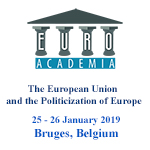Euroacademia Conferences
 Europe Inside-Out: Europe and Europeanness Exposed to Plural Observers (9th Edition) April 24 - 25, 2020
Europe Inside-Out: Europe and Europeanness Exposed to Plural Observers (9th Edition) April 24 - 25, 2020 Identities and Identifications: Politicized Uses of Collective Identities (9th Edition) June 12 - 13, 2020
Identities and Identifications: Politicized Uses of Collective Identities (9th Edition) June 12 - 13, 2020 8th Forum of Critical Studies: Asking Big Questions Again January 24 - 25, 2020
8th Forum of Critical Studies: Asking Big Questions Again January 24 - 25, 2020 Re-Inventing Eastern Europe (7th Edition) December 13 - 14, 2019
Re-Inventing Eastern Europe (7th Edition) December 13 - 14, 2019 The European Union and the Politicization of Europe (8th Edition) October 25 - 26, 2019
The European Union and the Politicization of Europe (8th Edition) October 25 - 26, 2019 Identities and Identifications: Politicized Uses of Collective Identities (8th Edition) June 28 - 29, 2019
Identities and Identifications: Politicized Uses of Collective Identities (8th Edition) June 28 - 29, 2019 The European Union and the Politicization of Europe (7th Edition) January 25 - 26, 2019
The European Union and the Politicization of Europe (7th Edition) January 25 - 26, 2019 7th Forum of Critical Studies: Asking Big Questions Again November 23 - 24, 2018
7th Forum of Critical Studies: Asking Big Questions Again November 23 - 24, 2018 Europe Inside-Out: Europe and Europeanness Exposed to Plural Observers (8th Edition) September 28 - 30, 2018
Europe Inside-Out: Europe and Europeanness Exposed to Plural Observers (8th Edition) September 28 - 30, 2018 Identities and Identifications: Politicized Uses of Collective Identities (7th Edition) June 14 - 15, 2018
Identities and Identifications: Politicized Uses of Collective Identities (7th Edition) June 14 - 15, 2018
Are “Brexiters” Indeed the Bad Guys? What Can We Learn from the Modern Game Theory and Economics of Federalism?
-
-

-
Presentation speakers
- Mitja Kovac, University of Ljubljana, Slovenia
Abstract:
After the Brexit referendum the general response on the continent and in mainstream media was unanimous. Brexiters have been portrayed as the bad guys that selfishly departed from the European Union. Shock that followed the Brexit vote was unprecedented and questioned the sole existence of the EU. Current chaotic UK government’s negotiations on the UK’s exit from the EU and related uncertainty will have unprecedented effects on the entire continent and has unleashed a deep institutional crisis of the European Union. Modern game theory and the economic theory of federalism may explain the causes of this crisis and also the economic impacts of the Brexit for the future of the European Union. The paper presents the game theoretical explanation for the Brexit and offers a set of the economic criteria that may be used by the EU policy-makers in order to mitigate the current crisis and to construct an efficient institutional framework on the vertical and horizontal division of competences to address the growing EU’s democratic deficit. The paper also argues that growing political distortions and increasing politicization of the EU will lead to increasing fragmentation and division. Moreover, the paper emphasizes the role of efficient allocation of rule making and argues that EU should reinforce a) its political-global dimension; b) its common cultural heritage; and c) should combat aggressively destructive nationalism, isolationism and cultural introspection. Furthermore, while employing law and economics insights of the constitutionalism, the paper offers several, economically inspired, instrumental insights on current triggering politicization processes inside the EU and offers a set of recommendations for an optimal policy intervention.
-
Related Presentations













